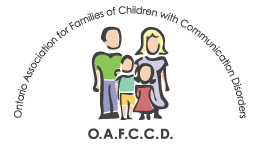Helping Students with Speech and Language Impairments
This 40 page Parent Guide will help parents of students with speech and language problems throughout the province. (See Guide below)
This Parent Guide will help parents to:
- Navigate the speech and language service system
- Prepare for transition to school
- Understand the special education systems
- Participate for the Individual Education Plan (I.E.P.) development
- Prepare for an Identification and Placement Review Committee (I.P.R.C.)
- Engage effectively with the school system
This easy to read Parent Guide is full of tips to empower parents as they support
their child’s success at school.
This guide is chronologically ordered with information covering transition to school, elementary and high school and the transition to post secondary education or employment.
Parent Guide Download now available in French
Parent Guide For Supporting Success At School – Helping Students with Speech and Language Impairments
- TRUST YOUR INSTINCTS
- What are Speech and Language Impairments?
- When should I be concerned about my child’s speech and language development?
- Who provides Speech and Language services to children?
- What is the parent role in the Speech-Language Pathology assessment?
- Additional sources of information
- PREPARING FOR SCHOOL
- Planning entry to school
- Getting the help you need for a smooth transition to school
- Preparing for a case conference or transition to school meeting
- Additional sources of information
- PARTNERING FOR STUDENT SUCCESS
- Building partnerships
- Additional sources of information
- SPEECH AND LANGUAGE IN PRIMARY GRADES, BUILDINGS FOUNDATIONS FOR LEARNING
- Oral language and literacy
- How are Speech and Language needs of children met in primary grades?
- Assistive technology
- Special Education programs and services
- Provincial testing – Starting in grade 3
- Additional sources of information
- SPEECH AND LANGUAGE IN JUNIOR AND INTERMEDIATE GRADES 4- 8
- How are students with speech and language impairments supported in grades 4 – 8?
- Self-advocacy
- Transition from elementary school to high school
- Additional sources of information
- SPEECH AND LANGUAGE IN HIGH SCHOOL
- Home and school partnerships
- How do speech and language impairments impact students in high school?
- Grade 10 literacy test
- Looking ahead: Planning for a life after high school
- Additional sources of information
- SPECIAL EDUCATION
- Why does my child need an Individual Education Plan (IEP)?
- How is the IEP developed? Who has input and who approves it?
- What are learning expectations?
- What is the difference between accommodations, modifications, and alternative expectations?
- What types of information should be included in an IEP?
- Who has access to the IEP during the school year?
- Can the IEP be changed? How often? What is the process?
- How can parents contribute to the IEP?
- What if I can’t attend school meetings about the IEP?
- Does my child need an IEP in high school?
- How do I know if the IEP is working?
- GLOSSARY
- APPENDIX 1: Ontario Secondary School Diploma (OSSD) Requirements
- APPENDIX 2: Individual Education Plan Parent Check List
